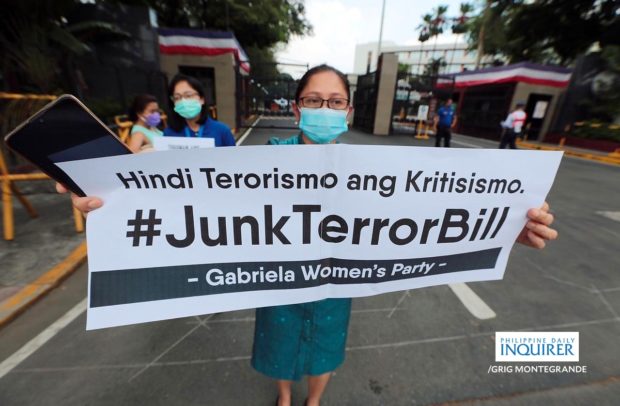
Progressive groups stage a protest and noise barrage outside the House of Representatives on Wednesday, June 3 to demand the scrapping of the anti-terrorism bill which Congress approved in its 2nd reading on Tuesday. INQUIRER FILE PHOTO / GRIG C. MONTEGRANDE
MANILA, Philippines — The controversial Anti-Terror Bill will cause “further shrinking of democratic spaces,” as well as it will weaken public discourse in the country, a group of Church leaders had warned.
“With the passage of the Anti-Terror Bill looming, we are like Queen Esther who is compelled to step forward and expose the sinister plot to destroy her people,” the group One Faith, One Nation, One Voice said in a statement released Tuesday.
“This bill will cause a further shrinking of democratic space and weakening of public discourse that will be detrimental to our nation,” the statement further read.
The statement was signed by prominent Church leaders such as Bishop Broderick Pabillo, Apostolic Administrator of the Archdiocese of Manila; Bishop Reuel Norman Marigza, general secretary of the National Council of Churches of the Philippines; and former Education Secretary Bro. Armin Luistro, among others.
The bill, which seeks to amend the Human Security Act of 2007, now only needs President Rodrigo Duterte’s signature after 173 members of the House of Representatives voted to pass the House bill regarding the measure.
Duterte previously certified the measure as urgent, even as the country still grapples with the coronavirus disease (COVID-19) outbreak.
Under the bill, it will penalize those who will propose, incite, conspire, participate in the planning, training, preparation, and facilitation of a terrorist act; as well as those who will provide material support to terrorists, and recruit members in a terrorist organization.
Any person who shall threaten to commit terrorism, and those who will propose any terroristic acts or incite others to commit terrorism shall suffer the penalty of 12 years, the bill further stated.
A person suspected of committing terrorist acts may be detained, even without a warrant of arrest, for 14 days, and is extendible for 10 days, according to the proposed measure.
Vice President Leni Robredo, the Commission on Human Rights and other human rights advocates questioned the timing of the bill’s passage, and cautioned that the the bill’s “vague” definition of terrorism may likely be prone to abuse.
The religious group added that the proposed measure will “insidiously strip away respect for human rights and other civil liberties.”
“A thriving democracy upholds freedom of speech, the rights to assembly and association, the right to expression of beliefs, and other inalienable rights of our people,” Church leaders said.
The group also pointed out that the bill is likely to be “misused and abused,” as well as its features reeks with the dark days of martial law during the time of late dictator Ferdinand Marcos.
“Likely to be misused and abused by those who wish to ‘lord it over’ the Filipino people, obliterate opposition, and quell even the most legitimate dissent, the Anti-Terrorism Bill is ominous with features that reek of the dark days of the Marcos martial law. The militarists have the ear and possibly the heart of the legislature.” the group said.
“We are speaking, even as we recognize that to do so is dangerous. For such a time as this, to remain silent only assures the impending destruction and abuse of our people,” the group added.